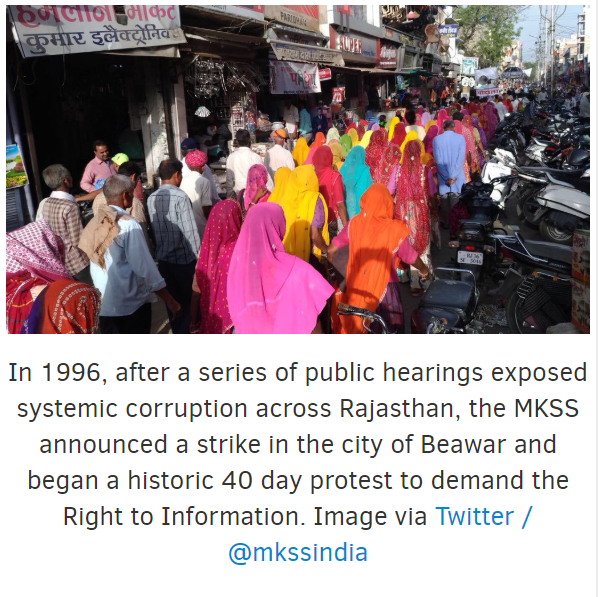This post is part of the Fiscal Futures blog series exploring some of the biggest issues that fiscal accountability enthusiasts are likely to encounter over the next 10 to 15 years. Learn more about the Fiscal Futures project and download resources here.
There has been growing skepticism about the impact of transparency initiatives on fiscal accountability issues. India provides an outstanding example of how social movements have creatively and effectively used the People’s Right to Information (RTI) to enforce a form of fiscal accountability that demonstrably connects allocations, expenditure, and policy with people and their priorities. How did this transformative process get initiated, and what lessons does it have for the future, and for its use in other parts of the globe?

Thirty years ago, a peasant and workers organization in Rajasthan, India — the Mazdoor Kisan Shakti Sangathan (MKSS) (Association for the Empowerment of Labourers and Farmers) — began their grassroots struggles with some very mainstream demands that are commonly made by the poor across the world: land and minimum wages. These were both issues of access to, and distribution of, resources. It was in the course of their struggles that the people realized that it was impossible to show the where, the how, and by whom they were being denied their most basic rights without access to records – more specifically, accounts of expenditure incurred in their name. Thus rang out the first, and soon to become, defining slogan of India’s energetic and robust right to information movement: “hamara paisa, hamara hisaab” (our money, our accounts). In many ways this concept defines fiscal accountability succinctly, powerfully, and from the point of view of a social movement in an entirely relevant way.
Another popular slogan from the movement, “the right to know, the right to live!,” points to the strong connections between transparency and the battles for survival of marginalized communities. What began as a demand for details of local expenditure soon grew into a widespread demand for a share of state and national resources. Campaigns emerged that not only demanded details of expenditure on public works, but put forth a cogently argued demand for the right to work and employment. In a situation of competing fiscal priorities, social movements realized that they had to be armed with information that could establish their entitlement, and also ensure delivery. Information was empowering individuals and communities to demand justice and their share of resources, and social movements, who had once seen these issues as elite and esoteric debates, now began to see them as essential weapons in their battles for justice. It was not transparency for itself, but transparency for accountability. It was not only to look at, and publicly audit expenditure, but also to demand an equitable share of resources for education, health, food, employment, social security, and even to redefine ‘development’.
The demands for transparency and accountability from grassroots movements led by the MKSS and others in India resulted in the passage of landmark legislation in 2005: the Right to Information Act. This law has changed the governance landscape in India, where millions of people use the law to request information from government on a variety of issues that impact their lives. Many of the same progressive forces that championed the enactment of an information law also successfully advocated for the passage of the National Rural Employment Guarantee Act in 2005 that entitles every rural family in India to 100 days of employment from the government. This multi-billion dollar program currently supports tens of millions of low-income Indians each year. The program is also designed in a way that allows beneficiaries to audit the use of the monies allocated to it. These rights-based laws have now spread to other sectors such as education, food security, and pensions for the elderly – and provide a model for how a rights-based framework can be adopted across sectors in a country.
Transparency when demanded and extracted by people is not easy to take back, even when the people face an autocratic political regime hostile to the idea of “development and democratic rights.” Once transparency becomes an integral part of the democratic lexicon, the demand for fiscal transparency and accountability presents an opportunity to strengthen other democratic battles – of speech and expression, equal access and inclusion, and participatory decision making.
Are there similar stories of the spread of such processes from other parts of the world, or can such success even be repeated?
While every story is unique, and Indian socio-political conditions have certainly been a contributing factor, it is the universality of the appeal for transparency and accountability that makes clear the potential for these issues to exist everywhere. The nature of their use and applicability might be modified in different places and countries, but following certain basic principles would result in empowering people to be able to make use of the democratic paradigms of transparency and accountability – even under hostile conditions.
For instance, social audits in Kenya, Mexico, Indonesia, Bhutan, Afghanistan, and South Africa have produced the same degree of excitement and involvement as has been seen in the Indian states where social audits were born and took root. This is because communities are allowed to frame their own questions. They are involved in the effort to access, analyze, and present the documents. And they are a part of the exercise as users and potential beneficiaries of the programs and their funds. Social audits have also had an affect far beyond their immediate and specific context.
Social audits are only a manifestation of principles that can be applied in very different ways. If people are allowed to frame their questions, and platforms can be created where they can demand answers, they will fight to support such a process from end to end, including the demand for access to information, as well as the demand for fiscal accountability that will likely arise from such access.
More importantly, there needs to be an understanding of the political nature of this set of demands. This is not something that can be donor-driven or controlled. Even worse is when a donor or set of donors waits to apply a “results framework” of some kind before providing support, or pulling the plug. It would be better to not support the effort at all than be the one to decide that the results are not commensurate with the support.
Speaking from our own experience in India, we only achieved what we did because there was no donor to ask us how much we achieved at each step along the way. It was the people who shaped and defined the questions, and who put in time, money, and courage to struggle against the resistance to transparency and fiscal accountability that exists everywhere. In fact, if there isn’t resistance, it means the vested interests are still secure and unconcerned.
These are also not campaigns that can be shaped by technocrats. There is a great need for technical support – but primarily to assist in demystifying and making comprehensible the financial transactions that have been deliberately placed in a technocratic framework of elite debate. This needs to be done with humility and solidarity from the “experts,” so that they see themselves as supporters in a cause defined by those most affected. This will allow the ordinary citizen to decide the nature and extent of the steps to be taken.
In some countries and situations citizens will use the platform of local self-government, and in other places, it might be part of a nationwide anti-corruption or anti-inflation movement. Questions related to fiscal accountability must, and do, permeate all such debates, but it is only when they are defined and shaped by the poor and marginalized that they will truly live up to their potential of becoming a part of the struggle for justice, development, and democracy.
Nikhil Dey is a social and political activist and a founding member of the Mazdoor Kisan Shakti Sangathan.


